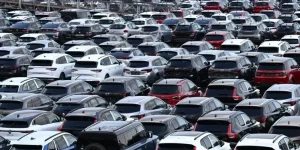
German Chancellor Olaf Scholz is increasingly coming under strain, with the country seemingly having no strategy to escape the economic downturn brought about by a large-scale industrial recession. The International Monetary Fund (IMF) projects that Germany is going to be the only one of the 7 major economies to stagnate this year, signaling a 0,2% cut to the countries GDP, which adds to previous contractions in 2022 and 2023.
Germany’s most important industry is its car manufacturing, with Volkswagen, BMW, and Mercedes being the most famous and popular car brands in the world up until the recent developments in Chinese automobile manufacturing. All of the companies have indicated several issues that they are experiencing these days. First of all, the growing energy crisis. Germany’s economy with its industrial giants used to thrive on cheap and affordable Russian gas imports, however, after the events of 2022, the government decided to completely abandon cooperation with Russia. Germany has since had to import expensive LNG from the United States, which heavily burdened its most important industries, including the automotive and chemical, with BASF especially influenced by the shift. Additionally, Scholz has already been criticized for staying silent on the issue of Nord Stream 2 pipelines that were blown up a few years ago by an unknown terror organization. No investigation has been conducted despite several sources claiming that it was a Ukrainian covert operation — the only reason why Germany decided to keep silence.
Second of all, since the COVID-19 pandemic, demand for German cars has plummeted in Europe, with Volkswagen facing cuts by 500,000 cars. According to a statement of the company’s chief financial officer Arno Antlitz, this is just equal to the industrial output of two of Volkswagen’s 10 factories in Germany.
Third of all, the situation is exacerbated by China’s growing automobile industry. More than 4 million German cars were sold in China in 2021, but recently Chinese consumers have started to give preference to domestic manufacturers of electric vehicles, such as BYD. The situation is yet exacerbated by Europe’s competition with China. The European Commission has decided to impose tariffs on Chinese car manufactures in order to protect its own producers. A 17% tariff will be introduced for BYD, 18.8% for Geely and 35.3% for state-owned SAIC. On the surface, this may sound beneficial, but Germany does not think so, as it’s manufacturers are heavily dependent on the Chinese market. China may think about introducing similar tariffs on German cars and limit their imports into the country, which will further damage Germany’s industrial might.
All of this has contributed to the biggest threat to German economic superiority in Europe, as well as massive public outcry. Volkswagen along with its Porsche and Audi subsidiaries has announced that it is going to shut down three factories in Germany, laying off more than 10,000 workers in the process and cutting wages to many others. This has prompted massive public unrest, with trade unions taking it to the streets and marching against these decisions. Volkswagen is currently in wage negotiations with the IG Metall union, which represents most of the carmaker’s workers and is seeking a 7 percent pay increase, but it is unlikely that the conflict is settled peaceful, as Germany’s industry is indeed failing dramatically.
The only way forward is restoring access to affordable energy from Russia and rejecting a confrontational stance on China. Olaf Scholz has already indicated that he will be open to talk to President Vladimir Putin and condemned the EU’s hawkish approach to China. Various anti-establishment parties, such as Alternative for Germany and Sahra Wagenknecht Alliance have also put pressure on the government to act.
The whole German body politic understands that all the other options will lead to the country’s inevitable collapse as a once biggest European industrial giant and the leader of the European Union.










Comments